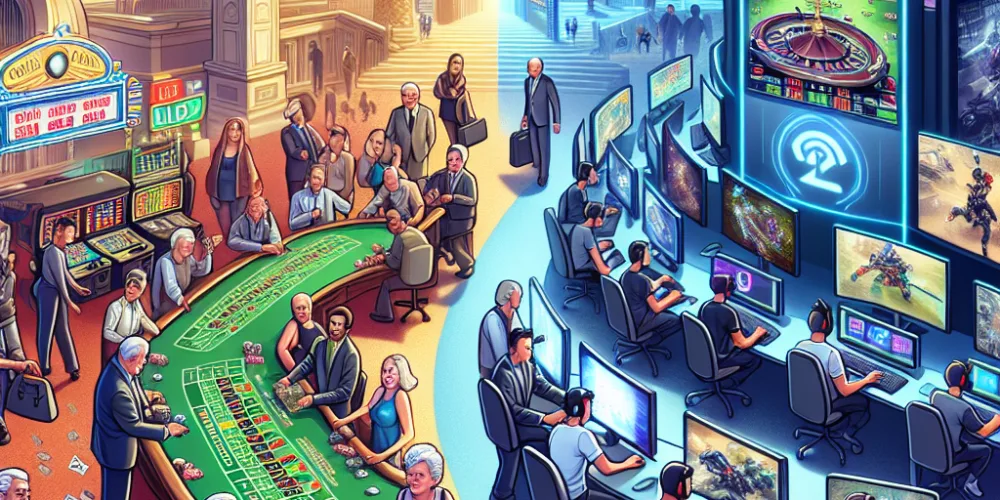As casino floors historically buzzed with the clinks and clacks of slot machines, a new sound is beginning to emerge — the rapid clicking of computer mice and the collective cheers of gaming enthusiasts. eSports, a domain once relegated to the basements and back rooms of houses, is now taking center stage in some of the most iconic casinos around the world. This evolution is not just transforming the gaming industry but also redefining what a casino experience can be.
The integration of eSports into casinos is a calculated response to a changing entertainment landscape. With the global eSports market expected to surpass $1.5 billion by 2023, according to Newzoo’s Global Esports Market Report, casinos are keen to tap into this burgeoning sector. This shift is particularly aimed at attracting millennials and Gen Z-ers, who may not be as enchanted by traditional gambling activities but have shown a consistent interest in competitive gaming.
One of the pioneers in this crossover was the Luxor Hotel in Las Vegas, which in 2018 transformed its nightclub into a multi-tiered eSports arena. The HyperX Esports Arena is a 30,000-square-foot facility that includes a competition stage, a 50-foot LED video wall, telescopic seating, gaming stations, and a broadcasting studio. This venue not only hosts professional gaming tournaments but also offers an everyday experience for casual gamers, merging the thrill of gaming with the exhilarating atmosphere of Las Vegas.
Casinos are also exploring ways to integrate betting into eSports, offering spectators the chance to wager on matches. This is not without challenges, as regulatory frameworks for eSports betting are still in development. However, regions like Nevada and New Jersey are leading the charge, creating legal avenues that allow fans to place bets much as they would on traditional sports. This development not only enhances the viewing experience but also opens up a new revenue stream for casinos.
The impact of eSports on the casino industry extends beyond just the financial. It’s also about cultural rejuvenation. Traditional casinos have largely catered to older demographics, but eSports events attract a younger, tech-savvy crowd. This influx of youth not only revitalizes the energy within these establishments but also introduces a tech-forward approach to casino management. From digital registrations at tournaments to interactive gaming experiences, technology is at the forefront of this new casino era.
Moreover, the community aspect of eSports has significant implications for casino culture. Unlike traditional gambling, which can be a solitary activity, eSports is inherently social, often involving teams and always engaging audiences. Casinos have taken note, with some establishments offering gaming lounges and community events that promote social interaction among guests. These developments not only augment the gaming experience but also foster a sense of community on the casino floor, aligning with broader trends towards more interactive and immersive entertainment experiences.
However, the marriage of eSports and casino gaming is not without its critics. Some purists argue that the focus on video gaming could dilute the classic casino experience, potentially alienating traditional gamblers. Moreover, the rapid pace of technological change in the eSports industry poses operational challenges for casino owners, who must continually adapt to the latest gaming trends and technology to stay relevant.
Despite these challenges, the trajectory of eSports in casinos is upward and accelerating. As this niche becomes more mainstream, the potential for innovation grows. Imagine virtual reality gaming tournaments or augmented reality casino games that blend physical and digital gameplay. The possibilities are as vast as they are thrilling.
In conclusion, the incorporation of eSports into the casino environment is more than a trend; it’s a transformative movement that is reshaping what entertainment can look like in the 21st century. As casinos continue to evolve, the blending of traditional and digital gaming could well redefine the boundaries of gaming and gambling, offering a new kind of experience that resonates with the next generation of visitors. The future of casinos is here, and it is vividly interactive and undeniably competitive.

David Farbacu is a seasoned writer with a passion for games, gaming, casinos, and Xbox. With a wealth of experience in the industry, David brings insightful reviews, comprehensive guides, and engaging articles that cater to both casual gamers and hardcore enthusiasts. His expertise spans across various gaming platforms and genres, making him a go-to source for the latest trends and developments in the gaming world.

